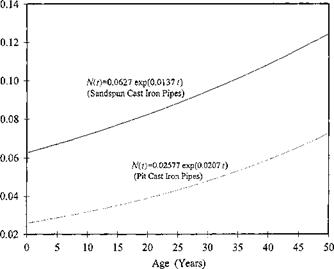Relationships among failure density function, failure rate, and reliability
According to Eq. (5.3), given the failure density function ft(t) it is a straightforward task to derive the failure rate h(t). Furthermore, based on Eq. (5.3), the reliability can be computed directly from the failure rate as
|
|
|
|||
Substituting Eq. (5.10) into Eq. (5.3), the failure density function ft(t) can be expressed in terms of the failure rate as
Example 5.3 (after Mays and Tung, 1992) Empirical equations have been developed for the break rates of water mains using data from a specific water distribution system. As an example, Walski and Pelliccia (1982) developed break-rate equations for the water distribution system in Binghamton, New York. These equations are
Pit cast iron: N(t) = 0.02577e00207t
Sandspun cast iron: N(t) = 0.0627e00137t
where N (t) is the break rate (in number of breaks per mile per year), and t is the age of the pipe (in years). The break rates versus the ages of pipes for the preceding two types of cast iron pipes are shown in Fig. 5.9. Derive the expressions for the failure rate, reliability, and failure density function for a 5-mile water main of sandspun cast iron pipe.
Solution The break rate per year (i. e., failure rate or hazard function for the 5-mile water main) for sandspun cast iron pipe can be calculated as
h(t) = 5 miles x N(t) = 0.3185e00137t
The reliability of this 5-mile water main then can be computed using Eq. (5.10) as ps(t) = exp^- J 0.3185e0 0137T d^j = exp[23.25(1 – e00137t)]
|

ft(t) = 0.3185e00137t x exp[23.25(1 – e00137t)]
The curves for the failure rate, reliability, and failure density function of the 5-mile sandspun cast iron water main are shown in Fig. 5.10.






Leave a reply